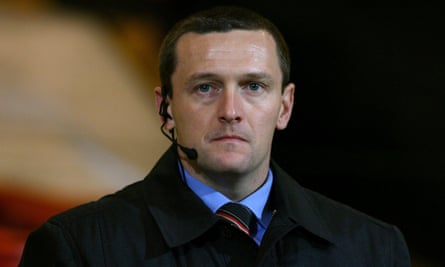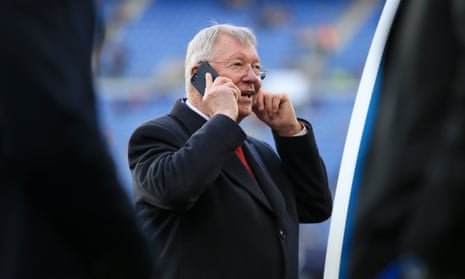At around this time in 2006, soon after Chelsea beat Manchester United at Stamford Bridge to secure a second successive league title, Sir Alex Ferguson’s phone rang. It was some bloke called Aidy Boothroyd, at the time just some gobby, upstart young coach who had somehow landed his Watford team in the Championship playoffs. “I phoned him up, asked for some advice and he gave me some pearls,” Boothroyd said later. “He lent me a couple of books and he’s always been at the end of the phone if I ever need any help. I think he does that for everybody.”
I remember being surprised by this at the time. Ferguson was 64, had already retired once, had won eight English league titles, was at the time the subject of savage and, it soon transpired, wildly misplaced criticism due to his side’s poor performance (they still finished second), and was just gearing up to win the league again in each of the next three years and five of the next seven. He had, in short, plenty on his plate already without being pestered for tips by fanboys. And yet there he was, lending books to Aidy Boothroyd. “He will always pick up the phone or phone you back if he can’t get to you the first time,” Boothroyd said the following year. “I’ve never known him not to call back.”
Eighteen years and 25 managerial appointments later Watford recently named Tom Cleverley their interim head coach, having initially put him in charge of their under-18s last summer. Nearly two decades had passed since Boothroyd first emerged, an entire generation, but a young manager’s source of helpful advice is the same. “I had a nice call off Sir Alex Ferguson,” Cleverley said after his first appointment. “He must’ve read somewhere that I had taken the job and we spoke on the phone for 10 or 15 minutes, which was nice. He gave me a couple of technical coaching points, a couple of psychological things and then we had a general chit-chat. I’ve not spoken to him for probably five or six years, so it was a really nice catchup and an unexpected one.”
“People say mine was a poor upbringing. I don’t know what they mean,” Ferguson once said of his childhood. “It was tough, but it wasn’t bloody poor. We maybe didn’t have a TV. We didn’t have a car. We didn’t even have a phone. But I thought I had everything, and I did: I had a football.” He might not have had a phone when he grew up, but it feels like he has rarely been off the thing since.
At the start of this season Kenny Cooper, a former Manchester United youth team forward who went on to play mainly in his native US, described a phone call he had received as he started a second career in coaching. “I reached out to Sir Alex seeking career guidance and I got a call back, maybe a day later, and I was blown away that he would take the time to do that,” Cooper said. “That acknowledgement and encouragement he gave me was so meaningful. Away from soccer, that was him understanding what that could do for me.”
In March, soon after John O’Shea (like Cleverley, a graduate of United’s youth system) was named interim manager of the Republic of Ireland, his phone buzzed with a call from an unrecognised number. “The only one who still calls me on no caller ID is Sir Alex,” O’Shea said. “Anytime I’ve gone into a club or got involved with something, he’s always got in touch.”
As Boothroyd’s experience suggests, it is not just people with connections to Manchester United who Ferguson tries to help. Ten years ago, soon after he first won promotion with Burnley, Sean Dyche was a regular correspondent. “More or less whenever I’ve needed it he has answered the call. He has always got time for you,” Dyche said. “He was like that when he was active as well. He has experienced virtually everything in football and I ask him advice and pick his brains.”

In the single year 2019, managers who spoke in public of receiving Ferguson’s assistance included Chris Wilder: “Sir Alex used to phone me as a young manager. He’d take the time out to help me out along the way. He used to do it to quite a few young British managers”; John Askey, then at Port Vale: “He has been very helpful with little bits of advice. He is very supportive, not only with myself but he helps a lot of managers”; and Steve Bruce: “He has been terrific, and not just for me. For any other manager, if there is ever a time you need a bit of advice, he is always there to help you”.
after newsletter promotion
It is impossible to know how many calls Ferguson has now fielded, how many careers he has tried to assist. For a while – perhaps still – he was a man constantly in search of fresh ways of helping out. “One of my hobbies now is to watch press conferences. For a manager … it’s an important part of your job,” he said in 2015, two years after his retirement. “I like watching the press conferences on Sky on a Thursday and Friday. I enjoy that. Several times I’ve phoned a few of the managers and given them a bit of advice. I phoned Nigel Pearson – I thought there was some elements where I could help him there. The same with Alan Pardew. And sometimes managers give me a call, ask me a bit of advice. So I’m not isolated from the game.”
In short, Ferguson has become a kind of managerial fairy godfather, always at the shoulder of those in need, ready to sprinkle some magic and keep them from being turned prematurely into pumpkins. He is 82 now, hopefully with years of wand-waving in him yet, and somehow still rising in my estimations. His achievements in management are a matter of record, but it is one thing to earn greatness, and another to know how to wield it.

